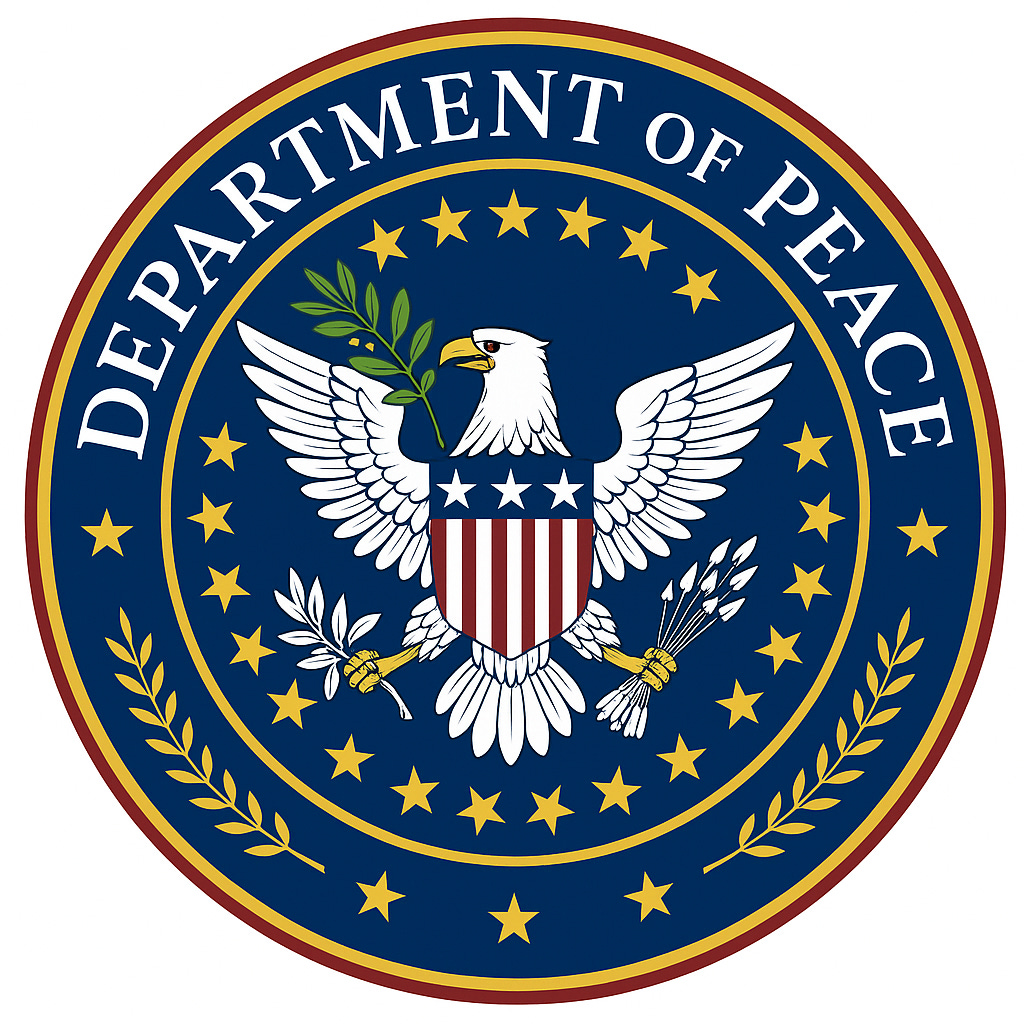If We Were Serious About Peace...
A Meditation by Rev. Cameron Trimble
“Blessed are the peacemakers, for they shall be called children of God.” —Matthew 5:9
Yesterday we learned that President Donald Trump, the man who is campaigning for a Nobel PEACE Prize, plans to sign an executive order today to rename the Department of Defense to the Department of War.1 We have surely fallen through the looking glass.
To many, it may seem symbolic, even petty. But I believe it reveals something deeper—something about who we are becoming.
This is not just semantics. It signals a shift in our national imagination—telling us what this administration believes about who we are and what we’re for. It makes plain what has long been true in practice: that we are a nation more invested in domination than in peace. We are more prepared for violence than for healing, more eager to flex power than to wield compassion.
If we were truly committed to peace, we would have a Department of Peace.
We would fund schools as generously as we fund weapons.
We would train diplomats like we train soldiers.
We would cultivate peace, reward peace, honor peace.
We would teach our children how to wage understanding instead of war.
But we don’t.
We glorify war.
We profit from it.
We proliferate it.
And now, we name it openly—as if naming it war is somehow more “honest,” more “manly,” more “American.”
But Jesus said, “Blessed are the peacemakers.” Not the warriors. Not the victors. Not the empire-builders. If we are to follow his teachings, we must ask ourselves: What are we really for?
Peace isn’t passive. It’s not weak. It doesn’t ignore danger or injustice. But it refuses to meet harm with more harm. It refuses to become the thing it fights.
To be a peacemaker is…
To reject the reflex of retaliation.
To stand in the breach, not with bombs, but with bravery.
To see our neighbors, even our enemies, as human.
To disarm not just weapons—but our own hearts.
So let’s be clear: the renaming of a department doesn’t change who we are. But it does ask us to choose—again and again—what kind of world we are building.
Let us choose peace.
Let us fund it, teach it, live it.
Let us become, in word and deed, a people worthy of the name peacemaker.
We are in this together,
Cameron
Reflection Questions
What does this renaming reveal about our national values?
Where in my own life do I default to power over peace?
What would it look like to truly cultivate peace—in my community, relationships, and decisions?
A Prayer for the Day
A Prayer for the Peacemakers
God of the long arc, You teach us that peace is possible, even in a world addicted to war. Break the spell of violence that holds our nation captive. Open our eyes to the cost of conflict, and open our hearts to a better way. Make us sowers of peace— even when the ground is dry, even when the winds of war howl loud. In your name, and in your hope, we pray. Amen.
Spiritual Practice
Embodying the Department of Peace
Take 10–15 minutes today for this reflective embodiment practice. Begin by sitting quietly. Breathe deeply. Let your body settle.
Now, imagine that you are a field agent for the Department of Peace. Not hypothetically—but truly. This is your calling. This is your sacred charge.
Ask yourself:
What is your daily assignment?
Where are you deployed—your home, your neighborhood, your congregation, your country?
Who are your collaborators? Who are your mentors?
What does “peacebuilding” look like today—in a fractured world, in a polarized society, in your actual life?
Write down your responses. Or move through your day holding this question in your heart: What would it mean to be a peacemaker in this exact moment?
Let this practice not be an escape from the world, but a re-entry—anchored in imagination, integrity, and spiritual clarity.
Upcoming Events That Might Be of Interest…
October 18, 2025 - No Kings 2.0 Protest - Scholars of authoritarianism teach us that we need 3.5% of the population rising up to disrupt the rise of authoritarians. The last protest had over 6 million people in the streets in the US (more around the world) which was one of the largest protest in US history. We need to double that number. So here we go again. The movement builds. See you on the streets.
October 23, 30, November 13, 20 2025, 7pm ET - In Search of a New Story: Reimagining What Comes Next, A 4-Part Online Series with Dr. Matthew Fox, Cameron Trimble, Ilia Delio, Diana Butler Bass, Caroline Myss and Luther Smith. We are living through the unraveling of many old stories—about who we are, why we’re here, and how we are meant to live together on this Earth. As these inherited narratives collapse under the weight of climate crisis, social fragmentation, and spiritual disconnection, the question becomes clear: What story will guide us now? REGISTRATION NOW OPEN!
I drafted a Strategic Framework for Congregations as we move into the coming years of increased authoritarianism around the world. If interested, you can download it here.
If you are a leader or member of a congregation looking for consulting support in visioning, planning, hiring or staffing, please consider Convergence.
https://apnews.com/article/donald-trump-hegseth-department-of-war-pentagon-067d89413670394c4d2149519dcb09c3



It seems to me that it has always been the department of war. When have we needed defense?
It is in fact the Department of War, so I support naming it honestly. It is not about defense. The constant wars, the hundreds of military bases all over the world, the extreme amounts of military spending not only hurt the rest of the world but endanger the USA, creating hostility to us all over the world. The allocation of resources means that we do not have the socioeconomic conditions most of the affluent world has.